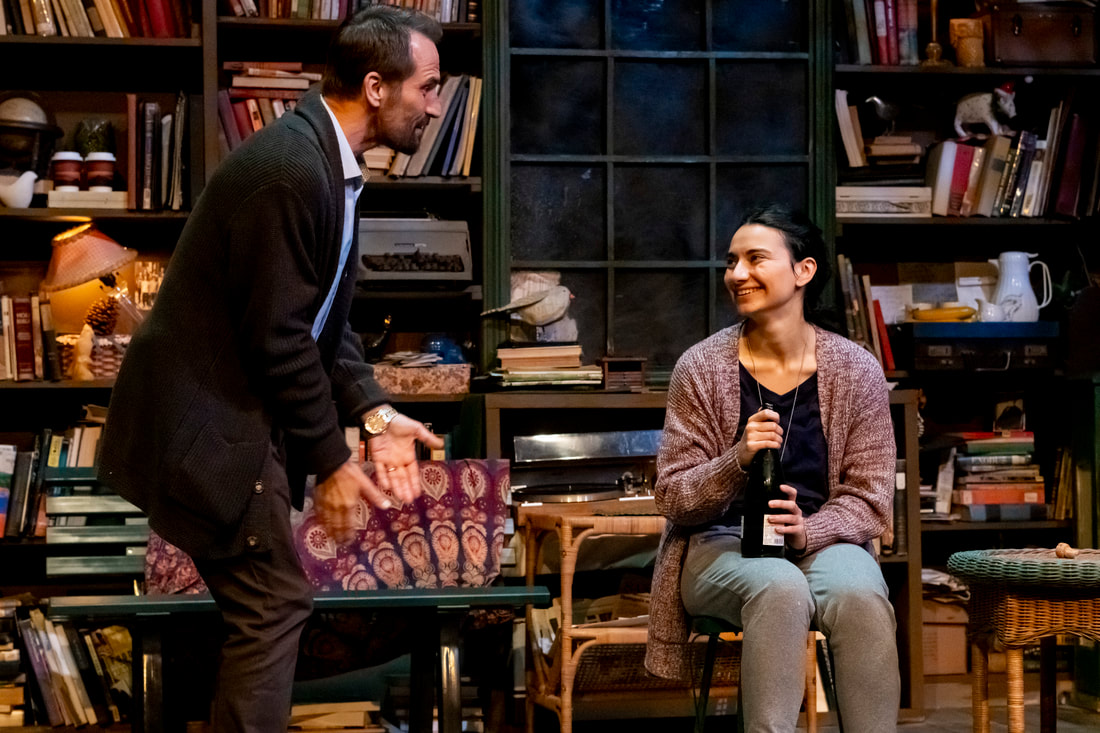|
Francis Gercke and Liliana Talwatte in "Proof." Photo by Daren Scott Mathematics, we’re told in David Auburn’s “Proof,” are elegant.
Human beings are messy -- really messy in the case of one Chicago family in which a brilliant mathematician, Robert, descended into mental illness, leaving his mathematically prodigious younger daughter Catherine feeling on the razor’s edge of the same fate. Backyard Renaissance Theatre Company is winding up an impressive Season 8 that has included a howling production of Yamina Reza’s “God of Carnage” and a superb “August: Osage County” by Tracy Letts with Auburn’s insular play which garnered both a Pulitzer Prize for Drama and a Tony Award more than 20 years ago. Interestingly, when “Proof” made its San Diego debut in 2003 at the San Diego Repertory Theatre with Danica McKellar starring, the part of Hal, a smart but awkward former student of Catherine’s father, was played by Francis Gercke. Now an older Gercke, a co-founder of Backyard Renaissance (with Jessica John and Anthony Methvin, who directs this current production of “Proof”), is portraying Robert. Under Methvin’s direction, Gercke delivers one of the richest performances I’ve seen from him. More on this soon. This is the first time I’ve ever seen “Proof.” For me, the plum is that I couldn’t care less about anything mathematical, nor do I understand the math bandied about in the story, yet the play’s nervous energy is consistent, and I definitely cared about the destiny of its protagonist, Catherine (Liliana Talwatte). All families are complicated – that’s a universal truth, or have you already forgotten your Thanksgiving weekend? Catherine not only confronts in both flashbacks and real time her relationship with her father, but the "well meaning" pushiness of her older sister Claire (a stalwart Wendy Maples) and the exasperating presence of young Hal (William Huffaker). Talwatte, who at times in designer Curtis Mueller’s lighting resembles Audrey Hepburn, conveys with mere glances or lingering stares so much of the inner conflict Catherine is suffering. And when she erupts, something else that seems to be a family characteristic, the pain or resolve behind it can be deeply felt on the elevated backyard patio stage by Yi-Chien Lee. “Proof’s” narrative flashpoint is the discovery by Hal – one directed to him by a furtive Catherine – of a mathematical proof about prime numbers that could revolutionize the field. But was it written by Robert in between manic episodes or by, as she claims, Catherine herself, who everyone BUT her father underestimated? “Proof” could have been titled “Doubt.” That title wouldn’t be taken until 2004, for John Patrick Shanley’s own Pulitzer-winning play. Besides Talwatte’s magnetic turn as Catherine, there is that aforementioned performance from Gercke. It’s challenging to believably portray mental illness onstage without venturing over the top. In his two flashback sequences Gercke allows the anxiety, the disorientation and eventually the manic deterioration to build. Yet it’s one gentle, lucid monologue in which Robert reflects upon the cloistered comfort of academia’s world of contemplation and self-discovery, that stands out even more. Huffaker’s admittedly nerdy Hal clambers around the stage and seems ever about to topple over from either nervous exuberance or desperation. It’s tough to imagine why even a loner like Catherine would be remotely drawn to him on more than a superficial level. But there it is. The comparative quiet of the first act gives way to timely blow-ups in the second; somehow the two parts of the whole coalesce. Director Methvin to his credit has given his cast room to explore and indulge Auburn’s complex characters. Ultimately, prime numbers mean nothing to me. Family dynamics, fraught with turmoil as they can be, indeed do. That should prove true for anyone who gives this play time to sink in and ferment. “Proof” runs through Dec. 9 at the Tenth Avenue Arts Center downtown.
0 Comments
Leave a Reply. |
AuthorDavid L. Coddon is a Southern California theater critic. Archives
July 2024
Categories |
David Coddon |
|
